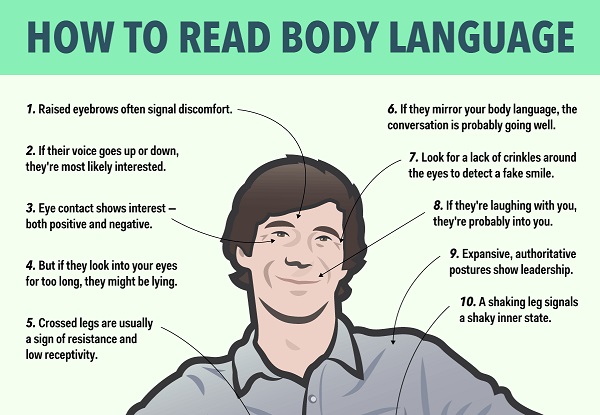A substantial amount of information is transmitted and received through non-verbal language, in fact, research indicates that in excess of 90% of meaning in a communication is conveyed non-verbally. If you have no understanding of body language, then you are missing out on a vital tool for reading people's true intentions. The ability to interpret body language is a skill that will enhance your own level of non-verbal communication. Understanding body language allows people to present themselves in a manner that is more open, likeable and credible to others.
Read the signs
When someone crosses their arms or legs
This quite depends on whether they’re sitting or standing.
Imagine these scenarios:
- Your boss wants to discuss your recent absences. He sits with his arms crossed, says he’s sorry you’ve been ill, then asks if there’s anything he can do. He’s being genuine: folding arms or crossing legs while seated means empathy, so you’re not getting your letter of warning yet.
- You need time off for the dentist. Your boss stands, arms folded, while you talk. He’s not happy. Standing with crossed arms or legs is defensive. He may be disapproving of the time you want off; he may also want to be alone — perhaps you’ve asked at a bad time. Either way, that filling has to wait.
When someone mirrors your gestures
It can be a sign that someone’s ‘clicked’ with you. But it’s also one of the easiest forms of body language to manipulate. For example:
- The new neighbours invite you round for drinks. Things are going well and you like them. You shift forward on the couch and within seconds they’re doing the same — they’re not trying to freak you out. This happens because when you’re in tune with someone, they unconsciously mirror your posture.
- At an interview you nervously lean forward, clasping your hands in your lap. The interviewer does the same. It might be he likes you and the job is yours… but it’s possible that he’s been told that mirroring the body language of a nervous interviewee will put them at ease.
 When someone shifts from foot to foot
When someone shifts from foot to foot
Yes, it could be that they are genuinely in a hurry. But they may also have something to hide. For example:
- Your cellphone bill is exorbitant, and you can’t work out the reason why. Your husband looks at you blankly. Your daughter denies all knowledge, while your 12-year-old son, on the other hand, is unusually lively for a Monday morning, and is keen to get to school. Make no mistake – he’s the culprit! Shifting from foot to foot shows fear of being found out, and wanting to get away before any guilt is spotted.
When someone’s pupils become dilated
Our pupils dilate because adrenaline is released when we’re excited or afraid. It can also mean someone finds you very attractive, but this isn’t always the case. For example:
- You’re at a casino with work mates and notice your friend’s eyes have become a tad dilated. They may have had a glass too many, or may be on the verge of getting a full house. People’s pupils dilate when they think they’re onto a winner.
Liar, liar!
Of course, we all want to know how to read body language so we can predict when someone is lying to us. So look out for the following:
- Lack of eye contact / Excessive eye contact
- Sweating
- Excessive hand movements
- Biting fingernails
- Chewing the inside of the mouth
- Dry mouth
- Rubbing their nose while you’re speaking to them (they may, of course, have an itch but no itch lasts for over 30 seconds)
- If they’re telling an enormous lie, flailing their arms to the side, fully outstretched
Let body language work in your favour
Times when your body language is important is at a job interview. Let's say you're crossing your arms and slouching a bit to appear “chilled”. You can’t quite look the interviewer in the eye, as this makes you nervous. Well chances are, you won't get the job – because all of the above is very negative body language.
Practice Positive Body Language
Posture
Hunched shoulders and a nervous look comes across as apologetic. Your posture should always make you appear open and approachable. Remember the basics; keep your shoulders back and never sit with crossed legs or crossed arms, as this makes you appear distant or closed to interaction. Especially when sitting, keep your back strait, this helps support your posture, maintains energy and command. Aim to keep your body language open and relaxed at all times. Your physical position and attitude can affect your psychological/emotional state.

Maintaining Eye Contact
Eye contact helps us build better rapport with people. Looking your interviewer straight in the eyes will show that you are confident and listening to what they are saying. You don’t have to stare and not break eye contact occasionally, that would be creepy. Looking at the ground or at your hands while talking can indicate that you are very nervous or you are hiding something. Try looking at your interviewer at the end of your sentence to reinforce the message in that sentence.
Gestures
Gestures can help give your voice extra energy and confidence, just make sure to keep the movements small and subtle. Gesticulating while explaining a scenario or telling a story will show that you are passionate or excited. They should be congruent with what is said e.g happy smile, open body postures or sad frown, closed body language. Be aware of denial gestures e.g. touching your face, rubbing your nose, scratching your head or fiddling with your clothes, hair or a pen. To improve your gesture: "Feel, show then say" first feel the emotion, show it with your body then say the words.
Fidgeting
You should definitely NOT fidget. This nervous energy will distract the interviewer from what you are actually communicating. Fidgetting includes; chewing gum, touching your face, biting your nails, putting your hair behind your ear, rubbing your neck. All of these are big no-no’s.
Take a coarse and learn how to understand and interpret other people's body language, and how to use body language effectively at work.













